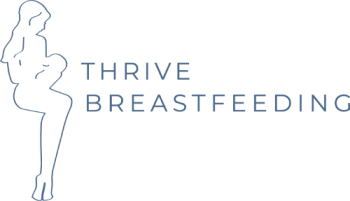Two words. Engorgement and mastitis. These two reasons alone are why it’s best to know how to safely stop making milk when finished breastfeeding. In other words, you can’t abruptly stop nursing and/or pumping and assume your milk will just go away.
You need to slowly lower your milk supply to safely stop making milk over time. For example, if you have a healthy milk supply on one day and don’t express milk the next, the door is wide open for infection. Of course, no one wants an infection at any time in their life. But an infection while caring for a baby? No, thank you.
Carefully Stop Making Milk And Avoid Engorgement and Mastitis
Failing to take the gradual approach to suppressing milk production can lead to engorgement. Engorgement can lead to clogged ducts which can then turn into mastitis. No fun!
The term engorgement is used to describe breasts that are painfully overfull of milk. Just like water balloons that have been filled to maximum capacity, your breasts become super hard, feeling tight and like they’re ready to burst. Not to mention, extremely painful.
Mastitis Warning Signs
Signs of mastitis include:
- Fever of 101 or higher
- Flu-like symptoms including aching illness and chills
- Hard lumps in breast
- Breast(s) are warm/hot to touch
- Wedge-shaped area of the breast
- Sweating
How Long It Takes to Safely Stop Making Milk
Slow and steady wins the race. Drying up your milk can take anywhere from a few days to weeks. In most cases, the amount of time it takes for your milk to go away depends on how long you’ve been making milk.
In short, the longer you have been producing milk, the longer it will take to go away.
Steps For Safely Stopping Milk Supply
- Decrease duration and frequency of feeding and pumping
- Avoid stimulation such as hand expressing nipples to see if you’re still making milk
- Turn down the heat when showering. Hot showers can elicit the milk ejection reflex. Otherwise known as a “let down”
When Breastfeeding Doesn’t Go As Planned
Of course, every single mama who reaches out to a lactation consultant is planning to breastfeed.
You’ve read all the best books. Nursing bras are stocked. The latest and greatest breast pump has been selected. Lanolin cream is packed for the hospital, as well as breast pads, breast shields, nipple shields, and twenty other things related to nursing. You even have a game plan in place for right after delivery for the best possible start for breastfeeding.
For weeks leading up to the big arrival, that little voice has been on a continuous loop saying: “SKIN TO SKIN IMMEDIATELY AFTER BIRTH!” It goes without saying, if breastfeeding doesn’t work out, it can throw you for a loop.
Why Stop Breastfeeding?
Therapist and a Certified Perinatal Mental Health Professional, Megan MacCutheon, works with moms experiencing mood and anxiety disorders during pregnancy and following childbirth. Megan shares many reasons why moms decide to stop breastfeeding:
- Mom is frustrated and exhausted
- Baby has a milk protein allergy
- Mom is going back to a job that doesn’t support a pumping schedule
- Mom isn’t making very much milk
Megan tells her moms, “Maybe you’ve tried it, and it’s just not for you. And that’s okay. Whatever the reason behind the decision to stop breastfeeding, it can bring up a lot of emotions.”
How To Safely Stop Making Milk: The Mental Health Check-up
Megan continues: “The most important thing is to recognize that these feelings—even ones that seem completely conflicting—are normal. First, allow yourself to notice the emotions you are experiencing. Acknowledge rather than suppress or avoid them. Next, come to terms with your decision to stop, recognizing it’s your own choice.”
What you tell yourself about your decision is what matters the most.
Megan MacCutheon, Therapist and a Certified Perinatal Mental Health Professional
Megan recommends paying attention to what thoughts you have regarding this decision and working on owning your choice from a place of empowerment rather than guilt or shame. “What you tell yourself about your decision is what matters most. Repeat this phrase: ‘I’m stopping breastfeeding because it’s what’s right for me.’ When you can own your decision and gain control over your own inner-critic, it becomes a little easier to block the extra judgment.”
For new moms looking for emotional support to navigate parenthood, Megan’s services include individual sessions, groups, educational programs, and workshops.
Need Help With How To Safely Suppress Milk Production?
Get in touch so we can create a plan for you to safely stop making milk when finished nursing or help with any other breastfeeding support needs.
